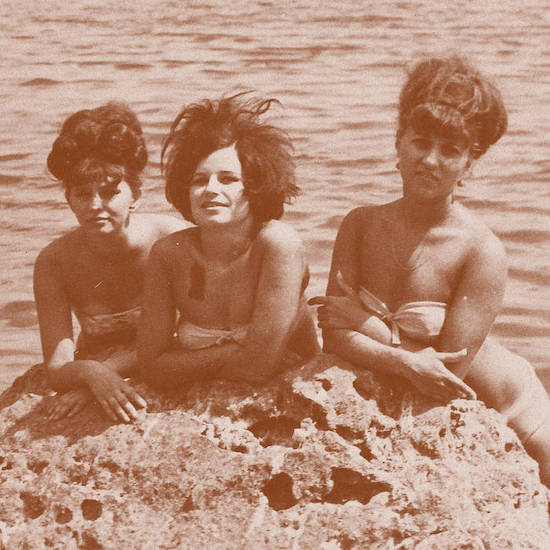Natalia Beylis’ music conjures the warmth of a pleasant memory. The Northwest Ireland-based composer and sonic artist’s pieces are built from discarded instruments, field recordings of places just passed and the sepia-toned edges of aging photographs. Her 2016 album Green Bird Fountain delved into the recesses of childhood memory and moving across countries to create poignant collages, while her THE SUNKEN HUM project accumulated daily field recordings taken over the course of a year into a sonic diary. The mystery of fleeting moments drives her music, colouring every one of her pitches in murky nostalgia.
On her latest album, Mermaids, she once again probes the sound of memories and the ephemera that keep them alive. The record came to fruition after Beylis discovered a CRB Elettronica Ancona – Model: Diamond 708 E electric keyboard while digging through the Leitrim recycling centre, and found an old image of her mother sitting with a couple of friends at the beach. The bubbling sound of the instrument and the watery landscape of the photograph led her to look underwater for sonic inspiration, but much of the album feels grounded on land, made of chirping birds, gravelly footsteps and dew-like glistening twinkles.
Beylis’ music is constructed from fragments of sound, spinning webs out of pulsing, rounded repetitions and distant recordings of her surroundings. Mermaids’ best tracks find balance between all of these elements while maintaining the poignancy of her simple, feathery melodies; when she looks exclusively to field recordings, like on ‘A Visit To Yasmin’, her music feels less alive, drawing on only the commonplace sounds of bird chirps and breezes. But on tracks like ‘The Lighthouse Trembles’, two trembling keyboard melodies collide and bob like waves out at sea, crashing at the shore and then receding again. With the hypnotic ‘Black Sea, 1967’, she takes on a darker tone, growing from a deep bass tone and simmering low resonances, creating a sense of bottomless unknown.
‘Mermaids’, though, proves to be the greatest example of Beylis’ vision. From the first floating tones, she conjures a magical radiance, like the kind that emanates from rediscovered memories and unearthed finds. It’s a wondrous track whose muted pitches and gentle motion feel like the sea on a still day. The same melody sings on loop, like replaying a brief, grainy film. It feels just like remembering something. The memory is just a few seconds that flash and repeat in the mind until it all fades away again.


